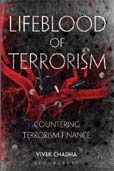You are here
Lifeblood of Terrorism: Countering Terrorism Finance

About the Book
Terrorism finance has aptly been termed as the lifeblood of terrorism. Yet, this remains one of the most under researched facets of terrorism. This limitation is even more apparent in the Indian context, despite the fact that the country has faced the scrouge of terrorism and insurgency for over five decades. Lifeblood of Terrorism: Countering Terrorism Finance, is the first book on the subject in an Indian context. The book contextualises the concept of terrorism finance to local realities based on distinct peculiarities as related to India. It documents the sources, transfer mechanisms and employment of funds for supporting organisational structures and acts of terrorism. The book also analyses two case studies to highlight in detail the methods employed for external and internal funding. The challenges associated with terrorism finance are further related to contributing factors which have aggravated the threat.
A SWOT analysis of existing sources, challenges and approach to terrorism finance is employed to suggest a strategy for countering the financing of terrorism. The strategy recommends measures at the policy planning level to curb the threat at the source of terror funding, transfer stage and during distribution of finances. The book further suggests organisational changes to improve the approach to terrorism finance without undertaking major restructuring of the existing setup.
About the Author
Colonel Vivek Chadha (Retd), served in the army for over 22 years, before taking premature release to pursue research. He is a Research Fellow at the Institute for Defence Studies and Analyses (IDSA), New Delhi. He has written extensively on counterterrorism and counterinsurgency in the Indian context. His single author books on the subject of terrorism include, Low Intensity Conflicts in India – An Analysis and Company Commander in Low Intensity Conflicts. In addition, he has contributed a number of chapters in edited books, papers in journals and articles for newspapers. He is the co-editor of the annual Asian Strategic Review and is on the editorial board of the Journal of Defence Studies at IDSA.
Contents
Introduction
Countering the Challenge
Relevance of Countering the Financing of Terrorism
Contextualising the Argument
Shaping the Approach
- Existing Assessment of the Sources and Linkages Between Terrorism Finance, Money Laundering and Crime
Identification
Assessment
Crime, Money Laundering and Terrorism Finance Nexus - External Sources of Terrorism Finance
NGO s, Charities and Donations
Counterfeiting of Currency
Narco Finance
State Sponsorship
Means of Transfer
Case Study: Fake Indian Currency Notes
Origin of Fake Indian Currency Notes
Creation of a National Network
Modus Operandi
Routes Employed for Transfer of Fake Indian Currency Notes
Implications of Conviction - Internal Sources of Terrorism Finance
Extortion and Taxation...
Crime
Non-Governmental Organizations
Designated Non Financial Businesses and Professions
Means of Transfer
Case Study of the United National Liberation Front - Contributing Factors
Identification and Evaluation of Threat
Corruption
Shortage of Manpower
Capacities
Coordination
Forensic Training
Prosecution and Conviction
Speed of Trial - Funding Patterns and Trends
Generational Funding
Diversity of Sources
Narco Terrorism
Trans Border Mobility
Counterfeiting
Conclusion - International Guidelines for Countering the Financing of Terrorism
UN Guidelines
Financial Action Task Force - Assessment of the US and EU CFT Initiatives
US Strategy
European Union Strategy
Assessment of US the and European Union Models - Existing Countering the Financing of Terrorism Framework and Purpose of a Strategy
Existing Framework
Purpose of Strategy
Long Term Vision - Strategy for Countering the Financing of Terrorism
- External Sources
Counterfeit Currency
D rug Trafficking
Non-Governmental Organizations/Charities
State Funding
Means of Transfer - Internal Sources
Extortion
Charities and Non-Governmental Organizations
Crime
Designated Non-Financial Businesses and Professions
Means of Transfer - Contributing Factors
Identification and Evaluation of Threat
Corruption
Need for a Unified Mechanism
Coordination
Legislative Support
International Co-operation
Border Management
Building Strength of Forces
Freezing Financial Assets
Private Sector
Capacity Building and Training
Prosecution and Speed of Trail
Conclusion - Countering the Financing of Terrorism Organisation: Assessment and Options
Countering the Financing of Terrorism Agencies
Policy Agencies
Criminal Justice and Operational Agencies
Evaluation of the Organisational Structure
Recommendations
SECTION I: SOURCES AND CHALLENGES OF TERRORISM FINANCE
SECTION II: International Guidelines and Case Studies
SECTION III: Strateg y for Countering the Financing of Terrorism
Annexures
Annexure 1: SWOT Analysis
Annexure 2: Statement of Manjunath J.
Annexure 3: Seizures Made by DRI
Annexure 4: The FA TF Recommendations: February 2012
Index
Order Hard Copy
Please email us at adps.idsa [at] nic.in or call +91-11-2671 7983 (Ext. 7303)


